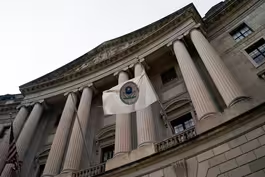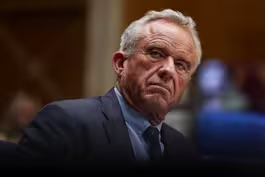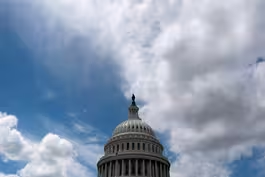
Port of LA head describes how tariffs are affecting imports
Clip: 5/14/2025 | 5m 53sVideo has Closed Captions
Port of LA head describes how Trump's tariffs are affecting imports
Trade tensions between the U.S. and China may be cooling but the economic fallout is still rippling through the Port of Los Angeles. This matters because the port plays a major role in the global supply chain and a slowdown affects everything from store shelves and prices to American jobs. Geoff Bennett discussed more with Gene Seroka, the port's executive director.
Problems playing video? | Closed Captioning Feedback
Problems playing video? | Closed Captioning Feedback
Major corporate funding for the PBS News Hour is provided by BDO, BNSF, Consumer Cellular, American Cruise Lines, and Raymond James. Funding for the PBS NewsHour Weekend is provided by...

Port of LA head describes how tariffs are affecting imports
Clip: 5/14/2025 | 5m 53sVideo has Closed Captions
Trade tensions between the U.S. and China may be cooling but the economic fallout is still rippling through the Port of Los Angeles. This matters because the port plays a major role in the global supply chain and a slowdown affects everything from store shelves and prices to American jobs. Geoff Bennett discussed more with Gene Seroka, the port's executive director.
Problems playing video? | Closed Captioning Feedback
How to Watch PBS News Hour
PBS News Hour is available to stream on pbs.org and the free PBS App, available on iPhone, Apple TV, Android TV, Android smartphones, Amazon Fire TV, Amazon Fire Tablet, Roku, Samsung Smart TV, and Vizio.
Providing Support for PBS.org
Learn Moreabout PBS online sponsorshipGEOFF BENNETT: Trade tensions between the U.S. and China may be cooling slightly thanks to a 90-day tariff war truce, but the economic fallout is still rippling through one of the country's busiest ports.
At the Port of Los Angeles, incoming cargo is down some 25 percent.
And this matters because the port plays a major role in the global supply chain, and a slowdown affects everything from store shelves and prices to American jobs.
We're joined now by Gene Seroka, executive director of the Port of Los Angeles.
Thanks for being here.
GENE SEROKA, Executive Director, Port of Los Angeles: Good evening.
Geoff.
GEOFF BENNETT: So tell me more about how the U.S. tariffs on imports, especially from China, have affected the overall cargo volume at your port.
GENE SEROKA: Geoff, at the Port of Los Angeles, for the month of May, we were expecting 80 ships to arrive with cargo from Asia, and we had 17 canceled.
The cargo volume will be down precipitously for four weeks, beginning last and continuing on.
And what that means for us is fewer job opportunities for our dockworkers, truckers, and warehouse folks in and around the port complex.
It's also going to put a strain on seasonal products on store shelves across the nation, as the cargo that moves through our port reaches each one of our country's 435 congressional districts.
GEOFF BENNETT: The 90-day trade war truce, I mean, how will that affect things at the port and how soon do you expect to see the impact?
GENE SEROKA: Well, it was welcome news out of Geneva over the weekend, more probably than some would have anticipated, but, Geoff, 90 days is not a long runway in our business.
Typically, that's about the amount of time it takes for a buyer here in the U.S. to put an order into a factory in Asia, have the product made, and then get it ready to be shipped out.
Some will try to pick up cargo that's already been manufactured and get it here to the United States through the Port of Los Angeles.
And others are simply doing the financial analysis and wagering whether this 30 percent tariff that was introduced is going to be the right price for them.
GEOFF BENNETT: With all of this volatility, do you see long-term changes in global trade patterns that could permanently reshape West Coast ports like the Port of Los Angeles?
GENE SEROKA: We do.
And the volatility really hits the commercial sector of our business directly.
Almost every meeting I have is an importer, exporter, or service provider telling me that they really need a better line of sight so they can make decisions.
After the tariffs were introduced at that 145 percent level on all China goods, many executives simply hit the pause button, slamming on the brakes on cargo from China, reevaluating other Asia locations with higher tariffs, slowing down on hiring, and capital investment.
But, going back to 2018, when the first tariffs went in on China, we saw a move to Southeast Asia for manufacturing.
In fact, at that time, 60 percent of our portfolio's business in the Port of Los Angeles was with China, both imports and exports.
Today, it's 45 percent and dropping.
GEOFF BENNETT: Are you in direct dialogue with any members of the administration about this, and what would you like policymakers to do to mitigate the impact of this trade war?
GENE SEROKA: I am on an advisory committee with the U.S. trade representative and their staff.
And I have been so impressed by their knowledge, work ethic and ability to listen.
But, realistically, what we saw here are a couple pieces.
This whipsaw effect of information that's coming out, the changes in policy that have happened so rapidly are difficult to keep up with even for the most seasoned veteran in this industry.
Think small and medium-sized companies who don't always have access trying to keep up with this and make the best decisions they can for their organizations.
Second, for every four containers that move through the Port of Los Angeles, we create a job that's very important across a wide variety of segments in our economy.
And in Southern California, it represents one in nine jobs.
About a million people go to work every day based on what we do at the port.
And the last piece is, I think that it's a real opportunity through this revised trade policy and different look at what we're doing with partner countries to really step up our entrance on exports to other trading nations.
Only 1 percent of manufactured goods in L.A. County get exported today.
And, as Americans, we only consume about one-third of all the harvested agricultural products in the nation.
If we can open up more markets, some good will come out of this for the export community.
GEOFF BENNETT: That's interesting.
You most answered my last question.
I was going to ask you, how do you intend to have your port stay resilient in the face of potential changes or further escalation in the trade war?
GENE SEROKA: We have done a really good job of chasing the cargo, partnering with shipping companies, because the speed component is so important to us.
We're growing even with the migration of manufacturing to Southeast Asia.
As we look towards more manufacturing in the U.S. and hopefully a focus on that agriculture market, we can flip the script right here and add more capacity for our outbound export customers.
We're ready.
GEOFF BENNETT: Gene Seroka, executive director of the Port of Los Angeles, an interesting conversation.
Thanks for being with us, sir.
GENE SEROKA: Thank you, Geoff.
EPA rolls back limits on forever chemicals in drinking water
Video has Closed Captions
Clip: 5/14/2025 | 4m 8s | EPA rolls back Biden-era rules against 'forever chemicals' in drinking water (4m 8s)
How RFK Jr. is shaping the conversation about autism
Video has Closed Captions
Clip: 5/14/2025 | 12m 25s | How RFK Jr. is shaping the conversation about autism and why advocates are pushing back (12m 25s)
How Trump's meeting with Syria's leader is a turning point
Video has Closed Captions
Clip: 5/14/2025 | 10m 26s | How Trump's meeting with Syria's new leader is a turning point for the war-torn nation (10m 26s)
'The Director' explores an artist in a time of trauma
Video has Closed Captions
Clip: 5/14/2025 | 6m 45s | New novel 'The Director' explores an artist's responsibilities in a time of trauma (6m 45s)
What's in the first draft of the GOP's 'big, beautiful bill'
Video has Closed Captions
Clip: 5/14/2025 | 5m 29s | What's in the first draft of the GOP's 'big, beautiful bill' cutting taxes and spending (5m 29s)
Providing Support for PBS.org
Learn Moreabout PBS online sponsorshipSupport for PBS provided by:
Major corporate funding for the PBS News Hour is provided by BDO, BNSF, Consumer Cellular, American Cruise Lines, and Raymond James. Funding for the PBS NewsHour Weekend is provided by...
















